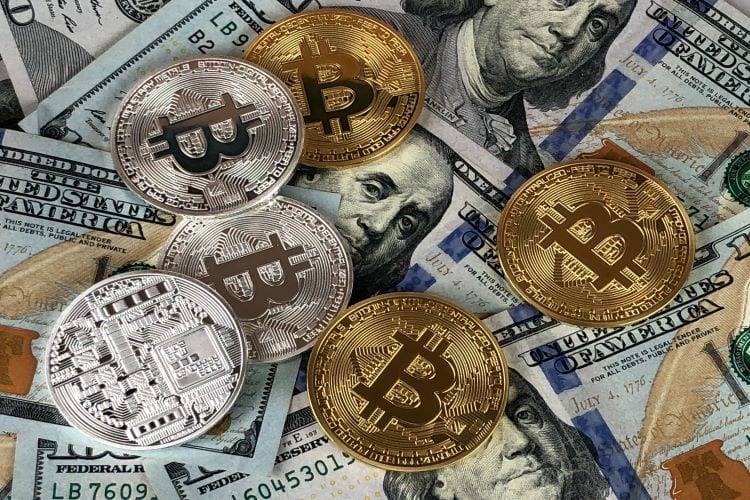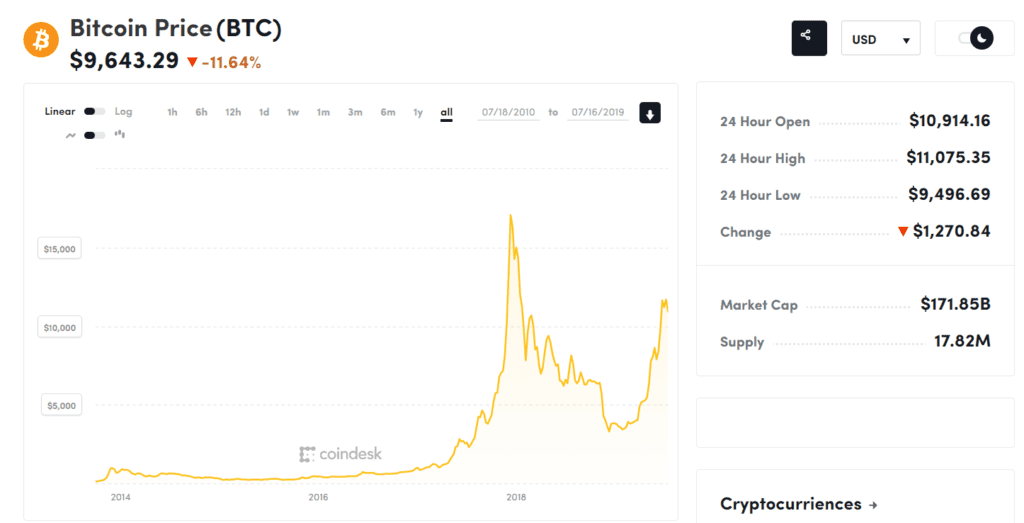What You Need to Know About Cryptocurrency

Depending on who you ask, cryptocurrency is either the future of money or a contrived waste of it. It’s gained prominence in recent years, but many people still don’t know much about it. Even people that own cryptocurrency may not know the basics about what they bought.
When Bitcoin began its meteoric rise from $1090.51 on March 31, 2017 to $17,132.11 on Dec. 12, 2017 many observers in the financial industry said it was a fad and a financial bubble rather than an investment. It didn’t matter much to the newly minted bitcoin millionaires – until bitcoin fell back to $3,000.
If you own it or if you’re just interested, here’s a crash course in cryptocurrency, whether you’re a confused owner or an interested spectator.
What Is Cryptocurrency?
While this may seem like a simple question, there are varying schools of thought among economists on exactly what cryptocurrencies are and what they can do. Here are the facts:
- Instead of a bank or intermediary to track transactions, cryptocurrencies rely on a distributed ledger-based on blockchain technology.
- Blockchains are secure by design, and the unique data associated with transactions prevents a single coin from being spent twice.
- Whenever crypto changes hands, a new “block” is added to the digital ledger. The transaction is logged, but no discernable personal information is otherwise exchanged beyond the public “key” of each party.
- The distributed ledger that holds the blockchain is stored independently on millions of computers. It requires the approval of at least 51% of systems in the network to make a change in the chain.
See Also: Blockchain Technology Explained.
The three primary functions of money are as a medium of exchange, store of value, and unit of account, and cryptocurrencies function as mediums of exchange every day when they’re used for purchases.
Debates Around Crypto
Experts disagree on whether or not cryptos like bitcoin can ever play a role as a store of value though. Treasury Secretary Steven Mnuchin is among those who believe in the merits of bitcoin as a speculative store of value, while Yale professor William N. Goetzmann is a notable dissenter. Goetzmann argues that because bitcoin is so volatile – since 2017 its daily price changes can be as great as 15% in either direction – it’s not a store of value. And unlike stocks that can also have volatile price swings, bitcoin has no underlying company, revenues or business value to justify its price.
In the same vein, Investopedia’s John Kelleher argues that bitcoin’s use as a store of value and as a medium of exchange are linked. “If bitcoin does not achieve success as a medium of exchange, it will have no practical utility and thus no intrinsic value and won’t be appealing as a store of value,” he writes.
On the other hand, Jaime Redman of Bitcoin.com writes “money cannot store value and, as innovative as bitcoin is, it will never be immune to market influences.” He cites the 19th-century Austrian economist Carl Menger who argued that all money is merely a medium of exchange and has no inherent value of its own. But that doesn’t solve the problem of bitcoin’s use. If it isn’t good for buying and selling at scale, and its value fluctuates too much to be an investment, what is it good for?
What Are Some Popular Cryptocurrencies?
Bitcoin is the oldest crypto and by far the most prominent. It was released in 2009 as open-source software and paved the way for the cryptocurrency boom. New currencies can be created by anybody at any time so thousands exist, but only three have a market cap greater than $20 million.
Ethereum is currently the second leading cryptocurrency, but it’s not a competitor to bitcoin. Ethereum is a decentralized software based on blockchain that can be used to run smart contracts. These are applications that can execute commands when certain conditions are met.
Beyond Ethereum and Bitcoin, there’s no clear third major cryptocurrency. XRP has the third-highest market cap, nearly $25 million, but is one of the lowest-priced cryptos. For reference, the price of 1 XRP doubled between September and November 2020, to reach a one-year high of $0.54 per coin.
How Can I Get Cryptocurrency?
People who are interested in cryptocurrencies can either buy them on an exchange like Coinbase, or they can “mine” them. Mining is a complicated process that requires a lot of computer processing power. While mining used to be popular, it has become difficult for individuals to mine coins. Every currency has a slightly different mining process, but analyzing Bitcoin specifically shows the challenges associated with mining.
Currently, an average of about 1,800 new bitcoins are mined every day, but when the crypto launched ten years ago, more than 7,000 were mined daily. The Bitcoin network will only allow 21 million coins to be produced. That means as more bitcoins are produced, mining becomes more difficult.
Cryptos can be transmitted from one person to another though, and there are a number of platforms that facilitate these transactions. The value of any crypto can fluctuate dramatically in a matter of hours. Many people attempt to buy up as much as they can when the price dips to sell for a profit if the value should spike again.
What Is Bitcoin Worth?
Bitcoin is a great example of how unstable cryptocurrencies can be. Between July 8th and 9th, the price increased by more than $1,000, but almost immediately lost $1,500 between July 10th and 11th. Since July 2018, the price has nearly doubled. Today, the price of one coin isn’t close to the all-time high, nearly $20,000 per Bitcoin.

Cryptocurrencies have value relative to standard currency, but that value fluctuates rapidly. As coins like bitcoin have become more popular, online retailers have begun to accept crypto as a payment method. This comes with its own inherent risks. The price you pay one day may be much different than it is in a week, month or year.
For instance, in 2010 a computer programmer who owned thousands of bitcoins in its infancy decided to buy pizza with his crypto to demonstrate use as a medium of exchange. He spent 10,000 BTC, which was worth about $30, to buy two large pies from Papa John’s. Today, 10,000 BTC is worth more than $120 million, and at its peak, it was worth more than $200 million.
While that’s clearly an extreme example, the logic stands. Any time you exchange cryptocurrency for goods you’re gambling in a sense. If the price tanks soon you got a relative bargain, but if the price skyrockets you’ll have overspent. In many ways, this is why cryptocurrency makes more sense as an investment than a medium of exchange.
What Can I Buy With Cryptocurrency?
Some major brands like Microsoft and Overstock accept bitcoin as payment, and they aren’t alone. When making any purchase online, you’ll be able to see if a retailer accepts cryptocurrency. Most brands only accept bitcoin and not smaller cryptocurrencies like ethereum or litecoin.
One handy tool is Coinmap, which shows business worldwide that accept bitcoin in-store. If nothing else, the map is an interesting visualization of how cryptocurrency has expanded since bitcoin launched in 2009.
What Are the Flaws of Crypto?
While the instability of cryptocurrency may be its biggest drawback, it’s not the only one. For example, the ability for bitcoin to execute transactions at the scale of a payments company like Mastercard has been an industry concern for a long time. (This issue is called the scalability of blockchain.) Transaction speed is one of the primary issues. Bitcoin can handle up to seven transactions per second, so how can it be expected to compete with Visa, which can handle 1,700 per second on average, and even more at its peak?
While many view cryptocurrency’s decentralized nature as a strength, it’s lack of regulation or inherent value may imply unforeseen issues. While cryptocurrencies are secure in theory and by design, the system as a whole is not infallible, as several hacks of exchanges and thefts of bitcoin have proven.
Should I Buy Cryptocurrency?
Some people believe that crypto is the future of currency as a whole. However, it’s clear that we aren’t there yet. If you intend to use cryptocurrency as a medium of exchange it may not be worthwhile, but it makes for an interesting investment. That is if you have a lot of patience and a steel stomach. There aren’t many other investments that are susceptible to 50% increases or decreases in a month.
Regardless of if you plan on buying crypto for yourself, it’s certainly worth following the expansion of bitcoin and other coins.










